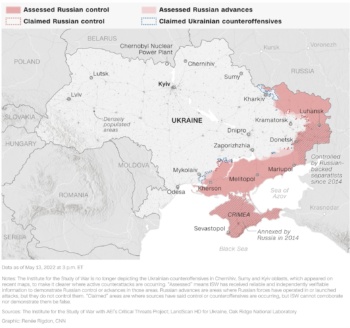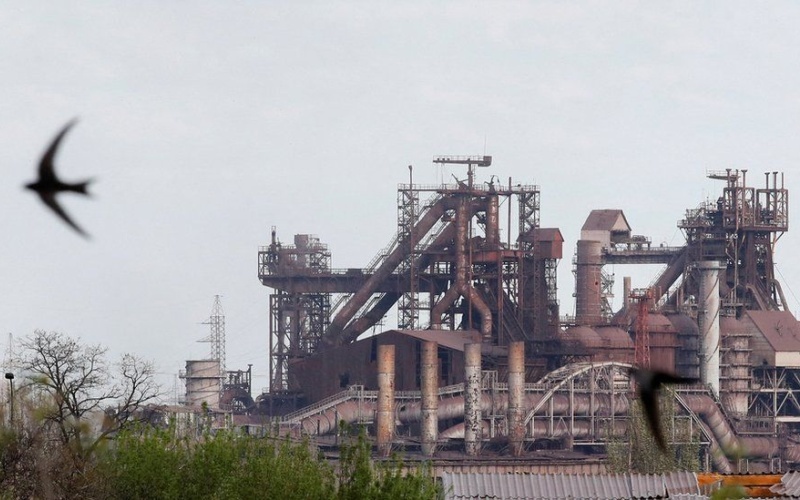The Azovstal steel works, destroyed by Russian attacks, in Mariupol in southern Ukraine (Reuters)
Friday’s Coverage: Russia’s “Deliberate and Criminal Attempt to Kill as Many Ukrainians as Possible”

Source: Institute for the Study of War
UPDATE 1308 GMT:
Russian soldiers have told The Moscow Times that they have to buy necessary equipment at their own expense.
“Several” servicemen said that, to prepare for fighting in Ukraine, they had to buy footwear, body armor, bandages, and tourniquets.
A A soldier in a military unit near the Ural Mountains said:
We have to buy everything ourselves, with our own money. I’m not even talking about modern body armor and helmets: there are no warm clothes, no dry rations or first-aid kits.
All the equipment we are fighting with in Ukraine stinks of mothballs, and the weapons jam.
The soldiers were promised a monthly salary of about 200,000 rubles ($3,365) if they pledge to fight in Ukraine. However, a serviceman in the National Guard explained:
A Level 4 combat vest — which can stop pistol and rifle rounds as well as shrapnel — costs on average 70,000 rubles ($1,200). A helmet is another 10,000 rubles ($160). Decent boots are about 5,000 rubles ($80), and you really need two pairs. A tactical vest costs from 5,000 to 10,000 rubles ($80-160). And you also have to buy a jacket, pants, T-shirts and pullovers. That comes out to about 200,000 rubles ($3,365).
He added, “If they issue you a field uniform, you’re in luck — you can save some money. We still have to buy the jacket and pants, at least as a change of clothing… I’ll be happy if our outlay on the uniforms pays off and we don’t get screwed out of our paycheck.”
A Russian soldier deployed in Ukraine at the beginning of the invasion spoke of the inadequacy of winter gear: “I got frostbite on both my feet. In Ukraine we were always freezing, day or night, and I was always thinking about how to get warm.”
Ruslan Leviev, founder of the Conflict Intelligence Team, said not all military tents had stoves and Russian soldiers were trying to keep warm with rugs.
UPDATE 1153 GMT:
US President Joe Biden, in South Korea to meet President Yoon Suk-yeol, has signed the bill for $40 billion in economic, humanitarian, and military aid to Ukraine.
Ukraine President Volodymyr Zelenskiy responded:
Grateful to @POTUS for signing the law on additional support for 🇺🇦. The leadership of 🇺🇸, President Biden & the American people in supporting 🇺🇦's fight against the Russian aggressor is crucial. Look forward to new, powerful defense assistance. Today it is needed more than ever.
— Володимир Зеленський (@ZelenskyyUa) May 21, 2022
UPDATE 1059 GMT:
At least six more people were killed on Friday by Russian attacks in and near the city of Severodonetsk in the Luhansk region of eastern Ukraine, said Luhansk military governor Serhiy Haidai.
In Severodonetsk, the easternmost city under Ukrainian control, two people were killed and three wounded when Russian forces fired on a school being used as a shelter.
T
Two women were killed by Russian shelling of Lysychansk and Privillia, and a man and a woman died near their house in Severodonetsk.
Russian forces have slain at least 19 people in the last 48 hours in the attacks on civilian areas.
hr>
UPDATE 1030 GMT:
Ukrainian officials say that Russian forces are preventing civilians from leaving the Russian-occupied Kherson region in southern Ukraine, trying to send them to Russian-occupied Crimea rather than Ukrainian-controlled territory.
Noting the escalation of Russian patrols and additional checkpoint, the officials said several people have been killed and many more injured when their convoys were stranded between Russian and Ukrainian lines.
A man was killed and several people injured last week when Russian forces fired on vehicles. This week at least three people were killed and many more injured by Russian fire on convoy of about 100 civilian vehicles, as passengers were trying to deliver medicines to Kherson city, to see family members, or to return to their homes.
Journalist and activist Olga Tokariuk posts an example of the Russian coercion of residents, noting in a follow-up, “Her head is not shaven….Doesn’t make the video more acceptable though.”
A hostage video from Kherson. A Ukrainian woman with swollen eyes and shaven head is forced to say on camera that she has undergone 'a denazification course', apologize to Russians. It's hard to imagine what was done to her. All proponents of Ukraine's concessions should watch it https://t.co/09Ds6qfagG
— Olga Tokariuk (@olgatokariuk) May 20, 2022
UPDATE 0645 GMT:
Finland’s gas system operator has confirmed the cutoff of supply by Russia’s Gazprom.
Russia threatened the halt earlier this month as Finland moved towards application for NATO membership. Gazprom cited Finland’s refusal of Vladimir Putin’s ultimatum to pay in rouble.
On Friday, Finnish state-owned gas wholesaler Gasum said supply would be halted from 4 a.m., and Gasgrid Finland announced today, “Gas imports through Imatra entry point have been stopped.”
Finnish officials have said that there will no disruption of service, with other sources making up the shortfall from the Russian cutoff.
ORIGINAL ENTRY: After more than 12 weeks of Russian bombardment, siege, and ground assaults, outnumbered Ukrainian fighters have ended their defense of the port city of Mariupol in southern Ukraine.
Over the past week, most of the defenders in the Azovstal steel plant, the last site of resistance in Mariupol, had surrendered. Those remaining inside the complex — many injured, with little food or medical supplies — indicated on Friday that they would soon lay down their arms.
In a live video on Telegram, Denys Prokopenko, a commander inside Azovstal, said only the dead remained.
The higher military command has given the order to save the lives of the soldiers of our garrison and to stop defending the city. I now hope that soon, the families and all of Ukraine will be able to bury their fighters with honours.
Hours earlier, Ukraine President Volodymyr Zelenskiy said the Ukraine military had told the troops that could leave and save their lives.
Zelenskiy issued a similar statement weeks ago, but the defenders — estimated at about 2,000, 60% of whom were injured — held on as about 1,000 civilians sheltered underground. Russian forces finally allowed the evacuation of the civilians, almost all women and children, two weeks ago.
The Russian Defense Ministry announced, “Underground structures of Azovstal…are now under full control of Russian armed forces.” Pro-Kremlin social media channels posted a video of Sergei Volynsky, the commander of Ukraine’s 36th Marine Brigade, saying his unit has surrendered.
At the eastern end of a coastal corridor along the Black Sea and Sea of Azov, Mariupol was a central objective for the Kremlin and Russian forces. Occupation of the city, which held out against takeover by Russian proxies in 2014, may establish a land bridge between Russian proxy areas in eastern Ukraine and Russian-occupied Crimea to the south.
However, Russia struggled to seize Mariupol despite overwhelming force. For 12 weeks, the operation tied down 12 battalion tactical groups — out of an estimated 125 in the Russian invasion — preventing them from being used elsewhere, including in Russia’s current offensive in eastern Ukraine.
The Russians resorted to widespread shelling and bombing of civilian sites, levelling much of Mariupol. Mayor Vadym Boychenko said more than 21,000 people were killed, as the attackers dug mass graves outside Mariupol and blocked humanitarian aid and organized evacuations. Many civilians eventually left in private convoys, but up to 100,000 remain in the devastated city.
Meanwhile, the Kremlin was defeated in its initial objectives, including quick entry into the capital Kyiv and other cities, the downfall of the Zelenskiy Government, and the detention or killing of Ukrainian leaders. Russian forces only claimed two cities in Ukraine, Kherson and Melitopol in the southern coastal corridor, and failed to establish sieges of other cities and towns. They withdrew from northern Ukraine at the start of April, narrowing their focus to the assault on the Donbas in the east.
See also EA with Radio Renascença: Putin’s Non-Victory Day in Ukraine…and Much, Much More
Show Trials Coming?
As groups of Azovstal fighters surrendered, Russian officials and MPs indicated that they would be put on trial over “war crimes”. The Defense Ministry said more than 900 troops are in “pre-trial detention” in a prison colony on Russian-controlled territory in eastern Ukraine.
See also Ukraine War, Day 84: Russia’s Show Trials of Surrendered Azovstal Fighters?
Russian forces denied further contact with fighters by the International Committee of the Red Cross after they were registered upon surrender. The organization said this week, “In accordance with the mandate given to the ICRC by states under the 1949 Geneva conventions, the ICRC must have immediate access to all PoWs in all places where they are held.”
Next week Russia’s Supreme Court will hear an application to designate the Azov Regiment as a “terrorist organisation”, paving the way for sentences of up to 20 years for those convicted of service in the Ukrainian military unit.
Natalia Zarytska, whose spouse was among the fighters in Azovstal, says, “My husband is on the way from one hell to another hell.”
Kremlin spokesperson Dmitry Peskov maintained on Friday that Russia will observe international norms for prisoners of war in its treatment of the Ukrainian troops.

